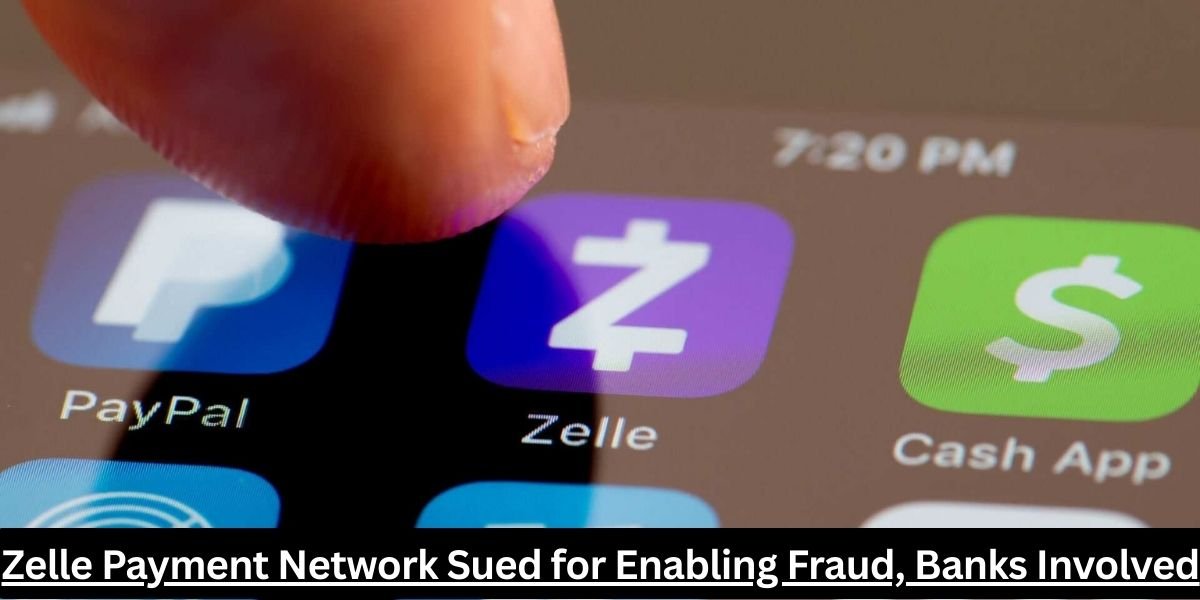Cybersecurity
Zelle Payment Network Sued for Enabling Fraud, Banks Involved: Shocking Statement

Introduction
The Zelle payment network sued for enabling fraud, banks involved—this shocking statement has raised concerns about digital payment security. Zelle, a widely used peer-to-peer (P2P) payment service, has faced blame for failing to protect users from financial scams. This article explores the details of why Zelle sued for enabling fraud, Banks’ role and responsibility in Zelle fraud cases, and what consumers can do to stay safe.
What Is Zelle and Why Is It Popular?
Zelle is a fast and user-friendly digital payment network that allows users to send and receive money instantly. It is integrated directly into many major banking apps, making transactions seamless. Unlike PayPal or Venmo, Zelle does not charge transaction fees, making it an attractive choice for users. However, this ease of use has also made it a target for scammers, leading to significant fraud-related losses.
Why was Zelle Payment Network sued for enabling fraud?
The Consumer Financial Protection Bureau (CFPB) filed a class action lawsuit against Zelle’s operator, Early Warning Services, along with some major US banks. The lawsuit claimed that these institutions failed to implement adequate fraud prevention measures. Here are the key accusations:
- Lack of Security Measures: Zelle reportedly failed to detect and prevent fraudulent transactions effectively.
- Consumer Losses: Since 2017, users have reportedly lost over $870 million due to fraud on the platform.
- Bank Negligence: The banks involved allegedly did not provide adequate fraud protection or refunds to scam victims.
The case drew attention because many users were left without recourse after falling victim to scams. Unlike credit card transactions, Zelle transfers are instant and irreversible, making it difficult for fraud victims to recover their money.
Which Banks Are Involved in the Lawsuit?
Zelle is owned by Early Warning Services (EWS), associated with seven major banks:
- Bank of America
- JPMorgan Chase
- Wells Fargo
- U.S. Bank
- Capital One
- PNC Bank
- Truist
These banks profit from Zelle transactions but often deny fraud claims, arguing that users “authorized” the payments. Regulatory agencies, including the Consumer Financial Protection Bureau (CFPB), are investigating whether banks are violating consumer protection laws.
Must Read: Several US Banks issue Debit Card alerts due to a Security Breach
Banks’ Role and Responsibility in Zelle Fraud Cases
The involvement of major banks in the Zelle lawsuit has raised serious questions about their role in consumer protection. Here’s why banks were sued:
- Lack of Refund Policies: Unlike credit card companies, banks have not been proactive in refunding fraud victims.
- Inadequate Fraud Detection: Many customers claim their banks failed to detect unauthorized Zelle transactions.
- Failure to Educate Customers: Banks have been criticized for not providing enough fraud awareness campaigns for Zelle users.
How Big Is the Fraud Problem on Zelle?
Several reports and user complaints highlight the growing fraud issue on Zelle. Here are some alarming statistics:
- In 2022, fraud and scams on Zelle accounted for thousands of consumer complaints.
- Over $440 million in disputed transactions were reported in just one year.
- Scammers use social engineering tactics, such as impersonating banks or convincing users to transfer money under pretenses.
Common scams include fake bank alerts, romance scams, and fake job offers. Fraudsters exploit Zelle’s fast payment system, leaving victims helpless once the money is transferred.
How Are Banks and Zelle Addressing Fraud Concerns?
Following the controversy, banks and Zelle have taken steps to enhance fraud prevention:
- Chase Bank now blocks Zelle payments initiated through social media interactions to prevent fraud.
- Zelle shut down its standalone app on April 2, 2025, focusing solely on integration with banks to improve security.
- Some banks have enhanced fraud monitoring tools and alerts for suspicious transactions.
However, consumer protection groups argue that these measures are not enough and that stronger regulations are needed.
How to Protect Yourself from Zelle Scams
Since fraud remains a concern, users should take extra precautions when using Zelle. Here are some effective fraud prevention tips:
- Only send money to trusted recipients – Avoid transferring funds to strangers or unknown contacts.
- Verify payment requests – If someone claims to be from your bank, call the bank directly to confirm.
- Enable banking alerts – Turn on real-time notifications for all Zelle transactions.
- Avoid urgent payment requests – Scammers often create a sense of urgency to manipulate victims.
- Report suspicious activity immediately – Contact your bank and report fraud to the CFPB if needed.
What’s Next for Zelle and Digital Payment Security?
The Zelle lawsuit has brought attention to security weaknesses in digital payment networks. Here’s what experts predict:
- Stricter regulations for banks and P2P payment apps may be introduced.
- Improved fraud detection technology could help prevent unauthorized transactions.
- Greater consumer education on safe digital transactions may become a priority for financial institutions.
Despite the legal case being dropped, public trust in Zelle has been shaken. Moving forward, banks and regulators will need to address security flaws to restore confidence in digital payment platforms.
Conclusion
The Zelle payment network sued for enabling fraud, banks involved—this case highlights the urgent need for stronger fraud protection in digital banking. Although the lawsuit was withdrawn, the concerns over consumer safety, fraud prevention, and bank accountability remain unresolved. Users must stay vigilant, and financial institutions must step up their security measures to prevent further fraud cases.
Read More
PayPal Phishing Scam: Don’t Get Hooked! Learn How to Stay Safe
-

 Phishing attack6 months ago
Phishing attack6 months agoWhat is Spear Phishing and How You Can Identify This Scam?
-

 Social engineering attack8 months ago
Social engineering attack8 months agoBaiting Attacks Explained: A Closer Look at Cyber Threat Tactics
-

 Social engineering attack6 months ago
Social engineering attack6 months agoWhat are Social Engineering Attacks – A Complete Guide to Cyberattacks Prevention
-

 Social engineering attack8 months ago
Social engineering attack8 months agoSpear Phishing Attack: A Targeted Cyber Threat
-

 Social engineering attack8 months ago
Social engineering attack8 months agoWhat is spear phishing attack? A detailed guide
-

 Phishing attack6 months ago
Phishing attack6 months agoWhat Are Phishing Emails? A guide for you
-

 Social engineering attack8 months ago
Social engineering attack8 months agoWhat is spear phishing in cyber security?
-

 Social engineering attack8 months ago
Social engineering attack8 months agoSpear phishing vs phishing: Understand the Risks




















